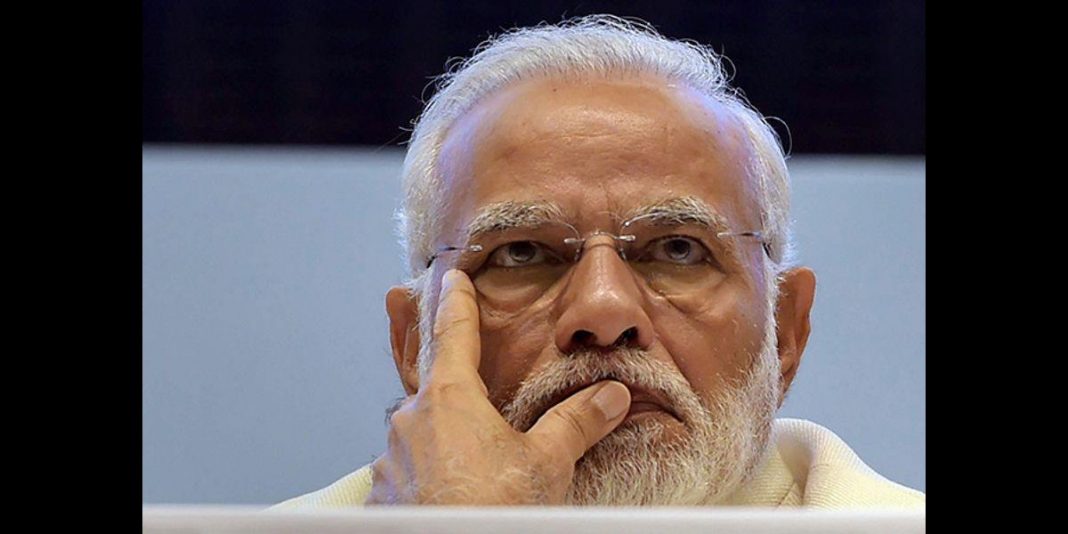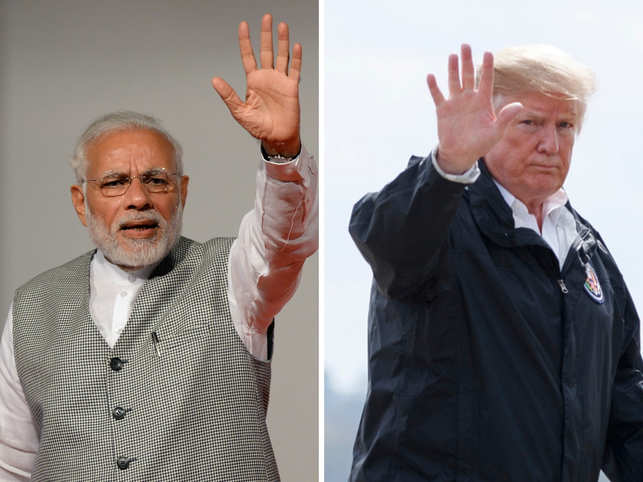Every month, Indian prime minister Narendra Modi, in his monthly address, used to recount his “achievements” vis-a-vis the failures of the previous governments. This month’s address coincided with Modi’s seventh tumultuous year in office. This month, Modi did not display his brand image “Modi hai to mumkin hai” (with Modi everything is possible), an allusion to surgical strikes against Pakistan and tit for tat to Chinese “intruders”.
He surprisingly displayed an altered tone in this month’s address. Instead of monopolizing credit for all achievements, mostly self-conceited, he recited his mantra “ sabka saath, sabka vikas, sabka vishwas”. He stressed the message that the achievements of the past seven years had been those of the nation.
Read more: Modi and his empty promises: Did Modi’s slogan sab ka vishwas ameliorate the Dalit in India?
He attributed his achievements to the “nation”. His subdued tone was apparently due to several factors, mentioned heretofore.
Covid-19 mismanagement
The Supreme Court termed the government’s vaccination policy as prima facie “arbitrary and irrational”. It declared the vaccine pricing policy also “flawed”. It noticed that the Centre was buying at Rs 150 a dose, half the vaccines produced in India and providing these free to the states to inoculate those aged 45 or above free of cost at government facilities.
And, it left the rest to be bought by the states and private hospitals themselves directly from the vaccine makers. The states were charged Rs 300 per Covishield dose and Rs 400 per Covaxin dose while the private hospitals pay Rs 600 for Covishield and Rs 1,250 for Covaxin.
The pandemic took the toll of about 4000 people a day. However, Modi made no mention of its severity. He avoided mentioning the shortage of oxygen cylinders and concentrators, medicines, and hospital beds. He did not tell that even fire-extinguishers were repainted and sold as oxygen cylinders.
Read more: Is Modi govt selling donated oxygen to Indians?
The opposition parties however claimed that the Modi government had inflicted ”unmeasurable pain” on the people in terms of joblessness, spiraling POL prices, the farmers’ protest, and mismanagement of the COVID19.
When healthcare infrastructure crumbled, people had to admit their loved ones in cow-shed clinics in the hope that Ayurvedic elixir of cow dung and urine would work miracles. About four thousand patients died every day. The bereaved families had to dump their dead bodies in the River Ganges as they could not afford wood to cremate dead bodies.
It is true that Modi’s euphoria that he had got rid of the pandemic did enable the pandemic to spread by leaps and bounds. On January 28, 2021, at the World economic forum, he announced victory against the pandemic by claiming, “My country has saved humanity from a big disaster by containing Corona effectively.” He rejoiced at election rallies in various states. He did not frown upon kumbh mela along the River Ganges.
Read more: Indians dump Covid-19 corpses in Ganges river
The elusive declaration of accession
During his stay in Pakistan, the president of the United Nations General Assembly remarked that Pakistan should raise the Kashmir issue more forcefully and that all parties should refrain from steps that affect the status of Jammu and Kashmir. India furiously reacted to the incumbent UNGA‘s president’s remarks. India called his remarks “misleading”, “prejudiced”, and “great disservice to the office he occupies”.
In an editorial comment, the daily Dawn dated May 29, 2021, pointed out, “Mr. Bozkir was making an obvious reference to the events of August 2019, when India moved to make constitutional changes paving the way for the illegal annexation of India-held Kashmir,” and allowing “430,000 new domicile certificates” to outsiders.
How could India change the disputed status of the Jammu and Kashmir State when it has no legally tenable proof that the disputed state acceded to India? India never presented the mythical Instrument of Accession to Pakistan or before the United Nations.
Read more: India’s claims on Kashmir rest on a dubious legal instrument
Isn’t it funny that, in the summer of 1995, the Indian authorities reported the original “instrument” as “lost or stolen”? Perry Anderson says that Kashmir became part of India in 1947 “with a forged declaration of accession”, and that the document then disappeared for “over half a century.”
Perry says, “A facsimile of the crucial page bearing his signature was published more than forty years ago, and the entire document was posted on the website of India’s Ministry of Home Affairs. However, when I sought permission to consult the original, I was told – it would be nice to think that the play on words was intentional – that the Indian government had “not acceded” to my request.”
Andrew Whitehead, London NW5, says that there is certainly something fishy about the circumstances of the accession. The evidence is compelling that the maharajah signed on 27 October, but was told to record the date as 26 October. The Instrument of Accession, according to Wolpert, was only signed by Maharaja Sir Hari Singh [if signed at all] after Indian troops had assumed control of the Jammu and Kashmir State’s summer capital, Srinagar.
Read more: The story of intrigues, deception & the dual accession of Kashmir
The accession to India by the so-called “constituent assembly” also is a farce. Aware of India’s intention to get the Instrument of Accession rubber-stamped by the puppet assembly, the Security Council passed two resolutions to forestall the foreseeable accession by the puppet assembly.
These resolutions are Security Council’s Resolution No 9 of March 30, 1951, and corroborative Resolution No 122 of March 24, 1957. They outlaw accession or any other action to change the status of the Jammu and Kashmir State.
Till about 1953, India continued to reiterate its obeisance to United Resolutions. Nehru continued to chant India’s commitment to a plebiscite, even after obtaining the doubtful instrument of accession from the maharajah, and getting it authenticated by the so-called constituent assembly of the occupied Kashmir.
Read more: Myth of Accession: A History of Kashmir
By flouting all resolutions on Kashmir, India has qualified as a rogue state to be subjected to sanctions. Pakistan needs to raise the Junagadh issue also still pending at the United Nations’ General assembly agenda.
India downgraded to “partly free” by Freedom House
Offended at being downgraded as “partly free” by the Freedom House and the V-Dem, India has announced to publish its own version of the Democracy Index. Several Indian states have resorted to violent struggles to get self-determination. India is holding them only through a slew of draconian laws which grant blanket immunity to its military and security forces.
India is the successor to British colonists. It knows that sooner or later it will have to grant the right to self-determination to unhappy people. To hoodwink the international community, it wants to portray the image of “free India”.
Read more: India tragically moving towards authoritarianism: Freedom House report
When India became independent, it was in the throes of several separatist movements like Dravidian South, Khalistan, besides insurgencies in the volatile north-eastern region. Then there were princely states that India devoured.
The Englishman held Indian states together at gunpoint. India, a successor to the British colonists, acted upon the same strategy to prevent the volatile states from secession.
Now the concept of self-determination is not confined to getting rid of colonizing power. It also applies to “breaking away from the old regime to form a new one”.
The Freedom in the World index ranks democracies on a scale. This index outlaws persecution of a people, or a minority by its own government. A disenchanted or persecuted community becomes entitled to self-determination.
Read more: Oppressed Kashmiris and the right of self-determination
Amitai Etzioni in Foreign Policy; Thinking Outside the Box (Chapter 9) has discussed the relationship between democracy and self-determination. He says, “The term self-determination is also used to refer to the normative principle that is evoked to justify breaking way from the old regime to form a new one. After all, if people break away from a democratically governed society and then become oppressed by people of their own kind no true self-determination is achieved.”
India has shrugged off the Freedom House ranking and announced to produce an index of its own. Etzioni’s analysis of self-determination movements in several cases explains why India is worried about being labeled “partly free”.
At the time of Partition, it was predicted that India and Pakistan would break up into ‘congeries of states’. The basis of this prediction was the inability of the new ‘dominions’ to deal with myriad self-determination movements. India was able to muzzle the movements. But, Pakistan could not. And, East Pakistan seceded into Bangladesh through India’s support to insurgents.
Read more: Bangladesh’s independence: a history marked with India’s tirade against Pakistan
Bannerjee shock
The West Bengal chief minister announced his full support for the chief secretary. Alapan Bandyopadhyay. Modi wanted to inflict exemplary punishment on him for skipping Modi’s review meeting in West Bengal in connection with cyclone Yaas on May 28, 2021.
He ordered the “babu” to report to New Delhi and answer a show-cause notice within three days, instead of the usual seven to 14 days. The “babu” shrugged off the notice on the plea that he had already retired on completion of superannuation service. Modi extended his service by three months which did not fructify.
Mamta quickly took him as her advisor at Rs. 2,50,000 a month. According to the media, “the official sources indicated that the Union Home Ministry has targeted him legally in the show-cause notice to keep the door ajar for his criminal prosecution for violating section 51 (b) of the Disaster Management Act, 2005.”
Read more: After COVID disaster in India, cyclone hits lacs of Indians
The government amended the Civil Service Pension Rules 1972 to ban any post-retirement publication by them without prior permission. Many retirees have expressed resentment against the draconian amendment. The government is trying to allay their fears with lame excuses.
It continues unabated as Modi’s all tactics have failed to win over the leaders.
Modi is visibly shaken up because of a host of factors. The persecution of minorities led to India’s downgrading on democracy ranking. There is strong evidence that the Indian government and Hindu extremists want to convert India into a habitat for only Hindus. India is a union held together by the use of force.
Read more: UN must call out India on its state-sponsored terrorism in Pakistan
Mr. Amjed Jaaved has been contributing freelance for over fifty years. His articles are published in dailies at home (The News, Nation, etc) and abroad (Nepal. Bangladesh, Sri Lanka, et. al.). He is the author of eight e-books including Terrorism, Jihad, Nukes, and other Issues in Focus. The views expressed in the article are the author’s own and do not necessarily reflect the editorial policy of Global Village Space.














